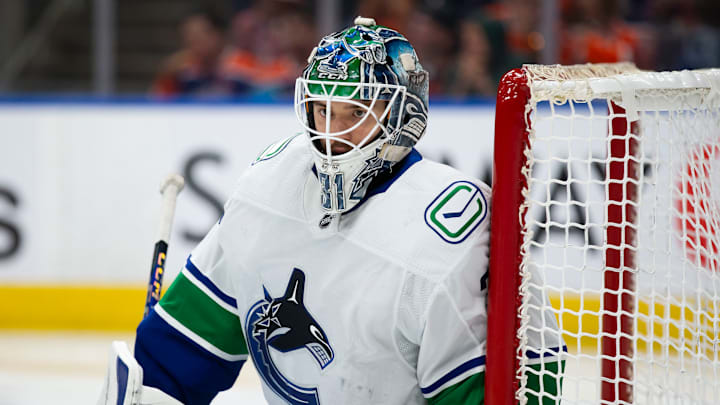The waiting is finally over - Artūrs Šilovs has re-signed with the Vancouver Canucks, on a two-year deal. As per Frank Seravalli of the Daily Faceoff, the new contract has an annual value of $850,000.
The announcement ends a period of uncertainty, with some question as to why it took longer than expected for the two sides to come to terms? As per Patrick Johnston of The Province, the situation was only further mired in a lack of clarity, with Šilovs' agent Paul Theofanous not replying to queries.
Now we appreciate that in the grand scheme of things, the actually length of time between Šilovs receiving his qualifying offer as a restricted free agent and agreeing terms was only 16 days (June 30 to July 16). And yet, in the world of the NHL and to Canucks fans in particular, it still must have felt like an eternity in some respects.
Which leads us back to asking why it took longer than expected, to come to terms on a new deal? In very simple terms it was of course about money, but lets delve deeper into this.
Receiving less than expected
Šilovs' previous deal was for three years, with an average annual value of $810,000, meaning his qualifying offer this time around was for $813,750. At the time of the offer though, the general assumption was that this was being made effectively as a placeholder, to allow for ongoing negotiations on a longer-term deal for more money.
However, while a two-year deal worth $850,000 annually does represent more money and term, it's not exactly a significant increase. In fact, AFP Analytics had projected Šilovs would get just over $1 million per season, something which the Canucks had just enough salary cap for at the time, to cover ( ($1,015,833).
Instead, the 23-year-old received an increase of just $40,000 annually - yes, $36,250 above his qualifying offer, but also $150,000 below $1 million per season. In addition, while the term of two-years was always expected, it's noteworthy just for the fact he will still be a restricted free agent once the new deal expires rather than being unrestricted.
Along these line, this helps explain -- at least in theory -- why there was a reluctance from Šilovs and his agent, to accept the offer on the table. Which by the way, for all we know, might have been even less than $850,000 annually at one point.
Still more to prove to the Canucks
General manager Patrik Allvin gave his comments about getting the young goalie re-signed, via a press release from the club. He said: "Artūrs helped us out a lot when called upon last year as he continues to grow and develop as a goalie. We expect him to come into training camp and battle for a full-time position with the big club. Our group will continue to work with him to help sharpen his skills and provide him with all the tools necessary to take another step forward in his young career."
While of course being open to interpretation -- perception is reality after all -- as much as Allvin sounding encouraging to a certain extent, he also seemed to be laying down a challenge for Šilovs. This continued the general manager's tone whilst negotiations were ongoing, in effect saying the goalie still had plenty to do to prove himself.
Given how Šilovs performed during the playoffs, it made Casey DeSmith expendable. As such, the assumption was that the Latvian native would be Thatcher Demko's main backup next season, thus improving his bargaining position.
And yet, again during the period of negotiations between the Canucks and Šilovs' side, there was speculation about the team looking for veteran backup to Demko. In hindsight, you have to wonder if this was -- at least in part -- a negotiating tool to send a message to Šilovs and his agent, to not ask for too much and be aware that other options were available?
Šilovs unfazed, no matter the stage
Objectively speaking, the Canucks' angle would have likely been influenced by the fact that no matter how good Šilovs was during the playoffs, he's still limited in his overall NHL experience. Interestingly, his 10 playoff starts this past season are more than his nine career regular season appearances in the NHL.
Effectively, this alludes to the Canucks wanting to see how Šilovs performs over a longer period of time. Plus, if you want to be picky, while a 2.91 Goals Against Average (GAA) during the playoffs is pretty good -- especially for someone still so green -- a .898 save percentage certainly needs to be better. (Coincidentally, he also has a career .898 save percentage in his nine NHL regular starts, with a slightly better 2.62 GAA.)
We would still argue though that the 2019 sixth round draft pick deserved more than he eventually received from the Canucks. When it comes down to it, he has a calm demeanour under the intense pressure of big moments which is an invaluable intangible, especially for someone so young.
Aside from a baptism of fire during this past season's playoffs, another prime example of this was Šilovs' performances during the 2023 IIHF Ice Hockey World Championship. He produced a .921 save percentage and 2.20 GAA in 10 games and was named the tournament’s best goalie and MVP, as he helped Latvia claim bronze after a stunning 4-3 win versus the United States.
Overall, it seems clear the Canucks 'won' this particular negotiation, with a deal which is certainly team-friendly. As such, all Šilovs can do is continue to prove himself which, if everything up to now is any indication, he will undoubtedly succeed at and thus put himself in a stronger position the next time it comes to discussing a new contract.
